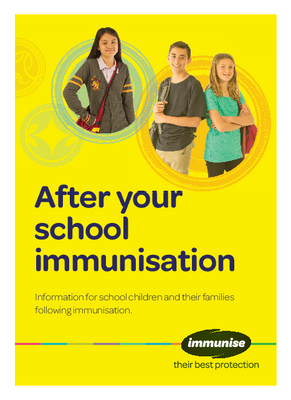After Your School Immunisation - HE1313

Information for school children and their families following immunisation.
The full resource:
You agreed to your child having an immunisation at school.
How your child may feel after the immunisation and what can help
Common reactions after immunisation usually go away after a few days. Serious immunisation reactions are very rare.
| What your child may feel | What can help |
|
|
|
|
If you have any concerns, ring your family doctor.
It is important to have both doses of HPV vaccine to be fully protected. If you have any questions, ring the vaccinator. Please do not contact the school.
If you cannot contact your family doctor or vaccinator you can call Healthline on 0800 611 116.
It is important to report any unexpected side effects after immunisation to your family doctor or the vaccinator. If you are unsure about whether a symptom might be related to the vaccine, discuss this with your family doctor or the vaccinator.
Health professionals should report reactions that happen after immunisation to the Centre for Adverse Reactions Monitoring (CARM). You can also report them by emailing CARM or using the online reporting form on the CARM website.
Code: HE1313.